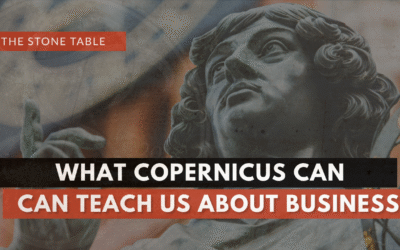Principles of Biblical Entrepreneurship and Leadership: What You do and Who You Are Matters to God

Before we talk about principles of biblical entrepreneurship, I’ll let you know our family was (and still is) a huge fan of the TV Show Psych, where a quick-witted smart-aleck with a photographic memory deceives the Santa Barbara police department into believing he has supernatural crime-solving abilities. My kids can probably still quote some Shawn Spencer quips better than they can the Bible or even principles about biblical entrepreneurship (and I’m not proud of this).
Shawn’s sleuthing partner is a high-strung, by-the-book, straight man named Gus, who’s opposing personality quirks provide a hilarious contrast and some of the show’s funniest moments. Gus is a self-described “sympathetic Cryer” who can break into tears at the slightest show of emotion from anyone, even random strangers he doesn’t know.
He just cries because they’re crying. I can relate.
Principles of Biblical Entrepreneurship #1: My Design
This expresses itself in interesting ways in my life, with my family, friends, and in the workplace. I’m empathetic by my God-given design. I feel what other people say to me. I can easily put myself in their shoes and see things from their perspective, even when they’re wrong. This can manifest in beautiful ways and help me connect deeply with others, both as a colleague and a leader.
Where principles of biblical entrepreneurship play a part is when I apply this to my work and business, it can sprout from a sinful root.
I like to be liked, and sometimes I will fall in line with someone else, not because I buy into their perspective, but because I don’t want to experience the discomfort of disagreement. That “niceness” isn’t always aimed at their good but at my comfort. Sometimes my empathy causes me to encourage and agree when truly loving the other person should manifest in confrontation and correction
Principles of Biblical Entrepreneurship #2: Beautifully Broken
The same God-given quality can be beautiful and it can be broken. It can be for the selfless good of others, and it can be for the selfish protection of myself.
There are instincts in me that are beautiful, that inform who I really am, what I should pursue, who I was created to be. And there are instincts in me that are broken, sinful, that want to flow downhill in the easiest direction toward my baser, fallen instincts. And sometimes they look the same even though their root is very different.
One of the principles within biblical entrepreneurship I’m referring to is that we need wisdom to stir up and embrace the beautiful, to recognize and repent of the broken, and to never confuse the two with one another.
“And lead us not into temptation but deliver us from evil.” This is a powerful portion of the Lord’s model prayer. I might synopsize it in my own words this way: “Heal the sinful, me-focused manifestations of my personality Lord, and resurrect the glorious God-honoring expressions of my original designs.
Principles of Biblical Entrepreneurship #3: Your Leadership
How is your leadership being redeemed by the Gospel? Where do you need to repent? What do you need to stir up? It might look the same but search your heart for the underlying motivator.
Here’s the Good News: Regardless if you’ve mastered the principles of biblical entrepreneurship or not, Jesus is standing ready to resurrect and empower the you He originally designed.
I want to finish off with another story that we shared last year with a ministry called Circle City Fellows. Not only does David Bell continue to do great work around the Indianapolis area with this ministry, but his leadership and vision for ministry is a perfect example of the principles of biblical entrepreneurship we’re talking about today.
Principles of Biblical Entrepreneurship: What You Do for a Living Matters in God’s Kingdom

Tables are gathering places, and The Stone Table is a Gospel gathering place.
That’s a key phrase we continue to use when discussing The Stone Table’s strategic vision and role in the Kingdom. We routinely remind ourselves we don’t have to create everything ourselves. We can join hands with others in the Body of Christ who are already doing incredible things via the principles of biblical entrepreneurship to create a beautiful Kingdom tapestry. We truly believe we are better together.
With that in mind, we want to introduce you to a new faith and work organization here in Indianapolis that is piloting a game-changing new fellowship. The Stone Table’s has long dreamed of a year-long faith and work discipleship program here in Indianapolis. So, when we met David Bell and Circle City Fellows, we were immediately intrigued by what they are creating.
Here’s their story.
Circle City Fellows is itself an example of the kind of work it exists to spark.
The heartbeat pulsing through this organization is a belief that God cares deeply about the principles of biblical entrepreneurship, mainly in the daily work of his people.
Founder and Executive Director David Bell has spent most of his vocational hours with the title “teacher” or “pastor.” In the past two decades, he has devoted himself to leadership development, whether teaching courses to Christian Ministries students at Taylor University, leading hundreds of young adults through a college ministry, developing his own leadership cohort curriculum, or coaching individuals and groups in his Enneagram consulting role.
In 2018, Bell was at a crossroads, asking God what was next for him and his family when he came across New City Fellows, a program dedicated to helping young adults integrate faith into their workplace in Raleigh, North Carolina. At the time, Bell says he was looking for a staff position at a church but was surprised by how much this vision embodied the principles within biblical entrepreneurship. The integration of faith and work caught his attention.
“I found myself drawn to this conversation,” he says. “How do you help people realize that what they do matters and that it matters to God and that it matters in God’s kingdom?”
Bell kept coming back to this question. As he shared it with friends, he says he found people in his life encouraging him to press into it, to explore the principles of biblical entrepreneurship for the sake of greater Indianapolis.
“I started meeting with various pastors in the area and other leaders of businesses in Indy asking, ‘What do you think? Is there a place for this kind of initiative in Indianapolis?’. Armed with a resounding “yes,” Bell assembled a board of directors and began connecting with faith and work organizations in other cities. He says he was compelled by a vision of raising up a generation of leaders committed to integrity and excellence at work and also to the welfare of Indianapolis.
Circle City Fellows is the tangible embodiment of that vision. Bell is creating a formative experience that integrates theological and cultural readings with discussions, mentorship, peer cohort learning, and vision days, and they’re actively using principles of biblical entrepreneurship to do it. As fellows dig deeper into the integration of their faith and work, they will also explore issues that relate directly to greater Indianapolis.
For Circle City Fellows to truly flourish, Bell says he believes the conversation needs to include as wide a swath of culture as possible, incorporating people from all different sectors of work.
“We want that cross-section because every one of those people influences other people, and if they see their work through the lens of God’s mission—to love God, love others and live God’s kingdom dream—they’ll do their job differently and will impact other people.”
This vision doesn’t let the Church off the hook. Given his background, Bell is quick to point out that the Church could grow in its understanding of principles of biblical entrepreneurship and the implementation of a healthy theology of work. In fact, he says fostering and furthering that conversation is one of the most exciting parts of this vision.
“When you’re on a church staff, your job is to be an equipper,” he explains.
“You equip people to do the work of God, as Ephesians four describes. Part of equipping people to do the work of God is reminding them that they do the work of God in the place where they spend the most time each week.”
Bell says Christians often misinterpret the assurance in Jeremiah 29 when God says, “I know the plans I have for you.” Though people are quick to hold it up as an individual promise, Bell points out that the promise was given to the Israelites as a people while they were in exile.
“God’s saying, ‘Since you’re in exile, I do have plans to prosper you,’” Bell explains. “‘But the way you’re going to get that is by seeking the welfare of the city. Seek the welfare of the city that just captured you and put you here. Seek the flourishing of that city—of Babylon, essentially. For you to flourish and prosper, Israel, it will be through the flourishing of this city.’”
Bell and others at Circle City Fellows are taking this promise literally, digging into the beauty and the mess of a culture often confused about the principles of biblical entrepreneurship and how our work plays into God’s story and emerging with one pivotal question: What would it look like for Indianapolis to flourish more and more, with the people of God engaging deeply in every sector of the workplace?
Interested in learning more or joining the next CCF class? Click here for info.
We’re excited to see what Circle City Fellows will bring to the Kingdom tapestry of Indianapolis and beyond in the coming years.



